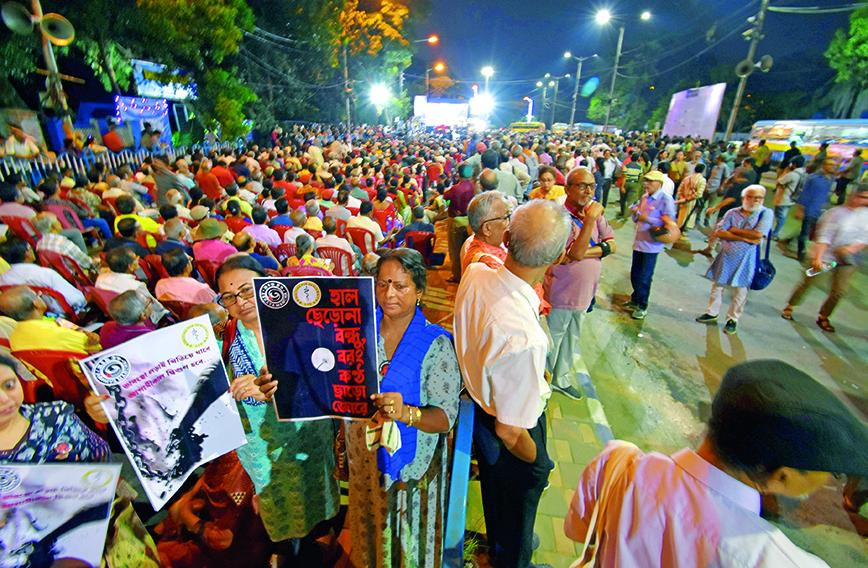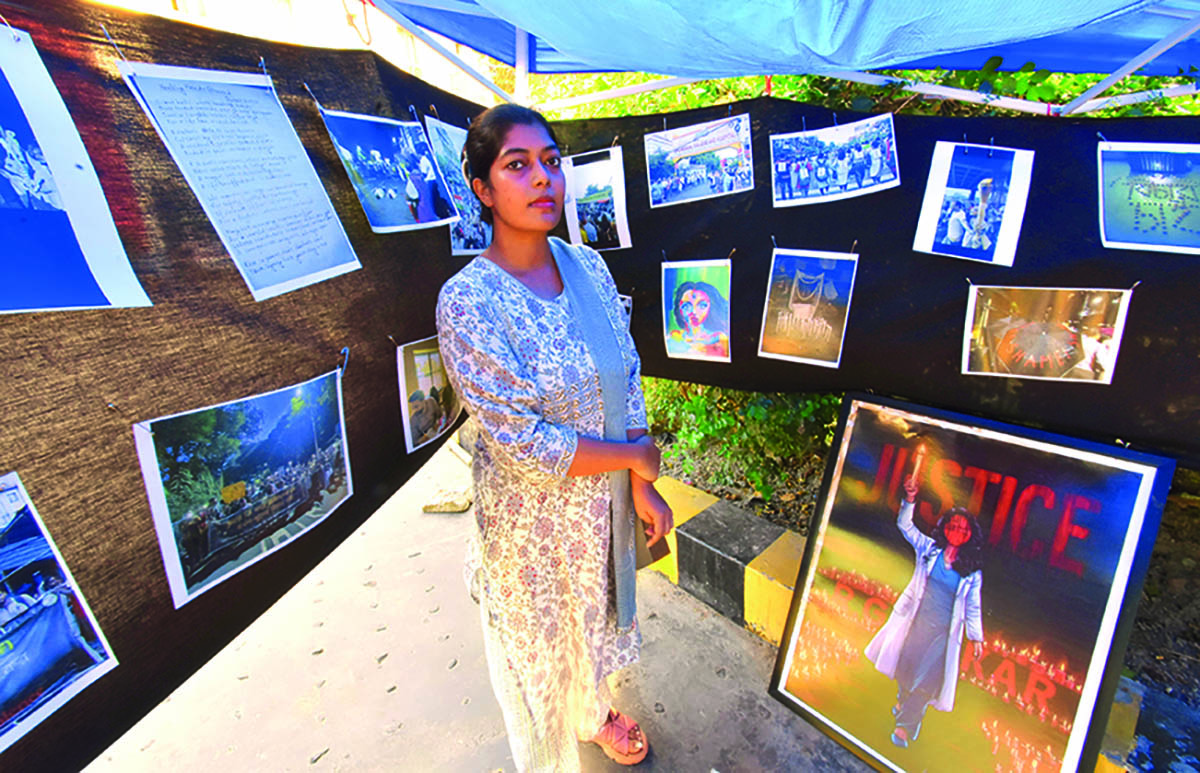
Citizens come out for a march in support of doctors’ demands
In a Kolkata hospital : ‘I can’t give you a glass of water here’
Aiema Tauheed, Kolkata
THE resting room in the School of Digestive and Liver Disease at the SSKM Hospital is cramped and grim with broken locks, two beds and a single table. A mattress perched on another two tables serves as a third bed. There is no attached toilet. This is where doctors are supposed to catch their breath during long shifts.
“If you ask me for a glass of water, I won’t be able to give it to you. This building has only one Aquaguard,” says Dr Bipresh Chakraborty, a DM Gastroenterology resident at the IPGME&R and SSKM Hospital.
“The lack of drinking water is astonishing. If you check the sodium levels of most resident doctors, including myself, they’re often raised. That means we’re dehydrated,” he says.
Ninety days after the brutal rape and murder of a young junior doctor at RG Kar Hospital, nothing much seems to have changed in Kolkata’s dismal government-run hospitals, despite protests by doctors joined by supportive citizens.
The agitation was called off briefly. But it resumed when doctors felt their demands for justice and improved working conditions were not being met.
On November 9, the West Bengal Junior Doctors’ Front (WBJDF) called for a citizens’ march from College Square to Esplanade. They set up a ‘Droher Gallery’, or Gallery of Rebellion, displaying write-ups, artworks and photographs by doctors, staff, and citizens on medical college campuses. A public ‘charge sheet’ was presented by the Joint Platform of Doctors, asking for accountability and listing government failures related to the case.
“From day one, our demands have remained consistent,” says Dr Chakraborty, looking haggard after a 42-hour shift at the SSKM Hospital. “Initially, there was no formal WBJDF. We were just an outraged group of medicos who gathered to protest. We organized ourselves into individual Resident Doctors’ Associations (RDAs) and began holding meetings, which eventually led to the formation of the WBJDF.”
 |
|
Dr Bipresh Chakraborty at SSKM’s ‘resting room’ |
Dr Chakraborty has been a vocal and steadfast participant in the protests. He also demonstrated compassion when he helped a police officer who fell ill during one of the demonstrations.
He explained that their original list of five demands focused on seeking justice for Abhaya, the name used for the young woman doctor who was brutalized and killed in the RG Kar seminar room. They wanted the government to address systemic failures that resulted in the tragedy.
“The primary demand was justice for Abhaya,” he says. “The other points were about holding accountable those in power — be it the principal, police officials, or others — whose actions or inactions played a part. We also aimed to maintain a democratic environment in medical institutions where every voice could be heard.”
As some demands were partially met, such as the transfer of key officials, the group refined their demands into a 10-point charter without altering their core message.
Dr Chakraborty discussed the few steps that have been taken to improve security. “It’s true that many CCTV cameras have been installed, but the way some have been placed is suspicious. Zones that could be covered by a single CCTV camera now have four or five at the same angle,” he says. “We laugh about it, but there’s a deeper concern. Could there be corruption tied to these installations?”
He emphasizes that corruption has become ingrained in the system. “They’re happy to fulfil demands if it means more money can be made. But despite all this, biometric locks haven’t been installed. There are only basic locks, not the biometric ones we need for safety.”
Requests for police personnel have also fallen on deaf ears. “The same old contractual guards, mostly uncles in their late fifties or early sixties, continue to be deployed. If something happens, we might need to save them,” remarks Dr Chakravarty. The ‘civic police’, basically ordinary people in uniforms, have also been put on duty at the hospitals.
Even basic facilities have not been provided as yet. “There are still no separate restrooms for male and female doctors,” says Dr Chakraborty. “Anyone can access common rest areas without notice, even patients’ relatives. There’s no attached washroom, and the biometric locks are absent.”
He stressed that this normalization of substandard conditions has gone on for too long. “Our seniors accepted it, and now we’re fighting to make sure our juniors don’t have to,” he said. “Not everyone protests. Many just adjust. We’re among the few trying to change things. Some of these are very small demands such as functioning air conditioners and drinking water. Yet, these issues persist.”
Dr Chakraborty’s disappointment highlights how the hospital system fails doctors. “Junior doctors are the backbone of the healthcare system. When the system depends so heavily on trainees, it’s a sign of deep structural flaws. And the government’s indifference only makes it worse,” he says.
The canteen situation remains dire. “SSKM includes several annexe hospitals where we’re required to work, such as PG Polyclinic and Shambhu Nath Pandit Hospital. PG Polyclinic is an annexe hospital, and SSKM itself is an exclusive gastro hospital,” he explains. “When we are on duty in these hospitals, we face the same long working hours, but there’s no canteen available. The PG hostel has a canteen, and the MBBS hostel has one as well, but the food quality is poor. This forces all MBBS students, postgraduates, and post-doctoral students to rely solely on the PG hostel canteen.”
The terrible condition of the canteen forces doctors to either order food online, which is difficult to afford on a meagre stipend, or go without a proper meal. Dr Chakraborty also points out that ordering food is not a healthy option.

Dr Sayantani Ghosh Hazra at the art exhibition organized by junior doctors
Dr Sayantani Ghosh Hazra, a third-year postgraduate trainee doctor in pathology at KPC Medical College and Hospital, fasted during the hunger strike days of the agitation, putting her health at risk.
She expresses cautious optimism about the changes taking place as she walks through the vast campus of KPC Medical College and Hospital which is splattered with artworks and slogans demanding justice.
“We do look at it hopefully. Some changes may take time and some are expected to happen. We are aware that our final-year examination is going to be held under CCTV cameras. Other strict measures have been introduced. We are hopeful about these changes,” she says.
Several security protocols have been put in place for the exams. For example, anyone entering an examination hall will be thoroughly checked for any objects that could be used for cheating. Additionally, there will be live CCTV monitoring of the examination, which they had asked for.
She also noted significant changes in how the exam papers will be reviewed. Previously, the exam papers were checked by in-house faculty. Now, all papers will be checked at a central location, with the assessment being done in a double-blind manner.
“This means that neither the person reviewing the papers will know whose paper they are checking, nor will the students know who is reviewing their papers,” she says.
She is of the view that the state has responded to the all-pervasive “threat culture” in the hospital. “Those who voiced their concerns were often threatened with supplementary exams, failure, or harassment,” she says. Implementation of the new exam Standard Operating Procedures (SOPs) should put an end to the hospital’s threat culture, she concedes.
The main purpose of the agitation, both Dr Hazra and Dr Chakraborty say, was to ensure that another Abhaya incident does not occur.
“The fact of the matter remains that it’s been 90 days, and we’ve all heard the phrase ‘justice delayed is justice denied’. It’s very painful to witness this, especially after all the protests,” Dr Hazra says.
Comments
-

Joe - Nov. 29, 2024, 2:23 p.m.
Great job on this!




